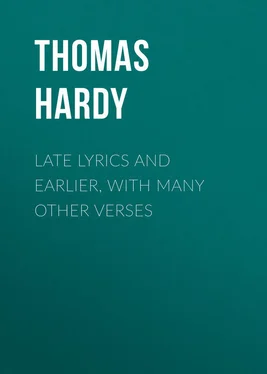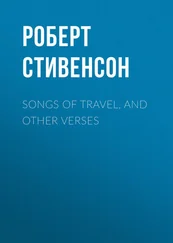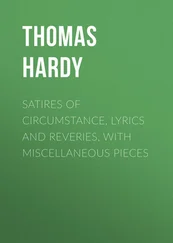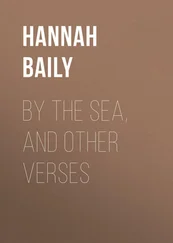Thomas Hardy - Late Lyrics and Earlier, With Many Other Verses
Здесь есть возможность читать онлайн «Thomas Hardy - Late Lyrics and Earlier, With Many Other Verses» — ознакомительный отрывок электронной книги совершенно бесплатно, а после прочтения отрывка купить полную версию. В некоторых случаях можно слушать аудио, скачать через торрент в формате fb2 и присутствует краткое содержание. Жанр: foreign_antique, foreign_prose, на английском языке. Описание произведения, (предисловие) а так же отзывы посетителей доступны на портале библиотеки ЛибКат.
- Название:Late Lyrics and Earlier, With Many Other Verses
- Автор:
- Жанр:
- Год:неизвестен
- ISBN:нет данных
- Рейтинг книги:5 / 5. Голосов: 1
-
Избранное:Добавить в избранное
- Отзывы:
-
Ваша оценка:
- 100
- 1
- 2
- 3
- 4
- 5
Late Lyrics and Earlier, With Many Other Verses: краткое содержание, описание и аннотация
Предлагаем к чтению аннотацию, описание, краткое содержание или предисловие (зависит от того, что написал сам автор книги «Late Lyrics and Earlier, With Many Other Verses»). Если вы не нашли необходимую информацию о книге — напишите в комментариях, мы постараемся отыскать её.
Late Lyrics and Earlier, With Many Other Verses — читать онлайн ознакомительный отрывок
Ниже представлен текст книги, разбитый по страницам. Система сохранения места последней прочитанной страницы, позволяет с удобством читать онлайн бесплатно книгу «Late Lyrics and Earlier, With Many Other Verses», без необходимости каждый раз заново искать на чём Вы остановились. Поставьте закладку, и сможете в любой момент перейти на страницу, на которой закончили чтение.
Интервал:
Закладка:
This is the weather the shepherd shuns,
And so do I;
When beeches drip in browns and duns,
And thresh, and ply;
And hill-hid tides throb, throe on throe,
And meadow rivulets overflow,
And drops on gate-bars hang in a row,
And rooks in families homeward go,
And so do I.
THE MAID OF KEINTON MANDEVILLE
(A TRIBUTE TO SIR H. BISHOP)
I hear that maiden still
Of Keinton Mandeville
Singing, in flights that played
As wind-wafts through us all,
Till they made our mood a thrall
To their aery rise and fall,
“Should he upbraid.”
Rose-necked, in sky-gray gown,
From a stage in Stower Town
Did she sing, and singing smile
As she blent that dexterous voice
With the ditty of her choice,
And banished our annoys
Thereawhile.
One with such song had power
To wing the heaviest hour
Of him who housed with her.
Who did I never knew
When her spoused estate ondrew,
And her warble flung its woo
In his ear.
Ah, she’s a beldame now,
Time-trenched on cheek and brow,
Whom I once heard as a maid
From Keinton Mandeville
Of matchless scope and skill
Sing, with smile and swell and trill,
“Should he upbraid!”
SUMMER SCHEMES
When friendly summer calls again,
Calls again
Her little fifers to these hills,
We’ll go – we two – to that arched fane
Of leafage where they prime their bills
Before they start to flood the plain
With quavers, minims, shakes, and trills.
“ – We’ll go,” I sing; but who shall say
What may not chance before that day!
And we shall see the waters spring,
Waters spring
From chinks the scrubby copses crown;
And we shall trace their oncreeping
To where the cascade tumbles down
And sends the bobbing growths aswing,
And ferns not quite but almost drown.
“ – We shall,” I say; but who may sing
Of what another moon will bring!
EPEISODIA
Past the hills that peep
Where the leaze is smiling,
On and on beguiling
Crisply-cropping sheep;
Under boughs of brushwood
Linking tree and tree
In a shade of lushwood,
There caressed we!
Hemmed by city walls
That outshut the sunlight,
In a foggy dun light,
Where the footstep falls
With a pit-pat wearisome
In its cadency
On the flagstones drearisome
There pressed we!
Where in wild-winged crowds
Blown birds show their whiteness
Up against the lightness
Of the clammy clouds;
By the random river
Pushing to the sea,
Under bents that quiver
There rest we.
FAINTHEART IN A RAILWAY TRAIN
At nine in the morning there passed a church,
At ten there passed me by the sea,
At twelve a town of smoke and smirch,
At two a forest of oak and birch,
And then, on a platform, she:
A radiant stranger, who saw not me.
I queried, “Get out to her do I dare?”
But I kept my seat in my search for a plea,
And the wheels moved on. O could it but be
That I had alighted there!
AT MOONRISE AND ONWARDS
I thought you a fire
On Heron-Plantation Hill,
Dealing out mischief the most dire
To the chattels of men of hire
There in their vill.
But by and by
You turned a yellow-green,
Like a large glow-worm in the sky;
And then I could descry
Your mood and mien.
How well I know
Your furtive feminine shape!
As if reluctantly you show
You nude of cloud, and but by favour throw
Aside its drape.
– How many a year
Have you kept pace with me,
Wan Woman of the waste up there,
Behind a hedge, or the bare
Bough of a tree!
No novelty are you,
O Lady of all my time,
Veering unbid into my view
Whether I near Death’s mew,
Or Life’s top cyme!
THE GARDEN SEAT
Its former green is blue and thin,
And its once firm legs sink in and in;
Soon it will break down unaware,
Soon it will break down unaware.
At night when reddest flowers are black
Those who once sat thereon come back;
Quite a row of them sitting there,
Quite a row of them sitting there.
With them the seat does not break down,
Nor winter freeze them, nor floods drown,
For they are as light as upper air,
They are as light as upper air!
BARTHÉLÉMON AT VAUXHALL
François Hippolite Barthélémon, first-fiddler at Vauxhall Gardens, composed what was probably the most popular morning hymn-tune ever written. It was formerly sung, full-voiced, every Sunday in most churches, to Bishop Ken’s words, but is now seldom heard.
He said: “Awake my soul, and with the sun,”.
And paused upon the bridge, his eyes due east,
Where was emerging like a full-robed priest
The irradiate globe that vouched the dark as done.
It lit his face – the weary face of one
Who in the adjacent gardens charged his string,
Nightly, with many a tuneful tender thing,
Till stars were weak, and dancing hours outrun.
And then were threads of matin music spun
In trial tones as he pursued his way:
“This is a morn,” he murmured, “well begun:
This strain to Ken will count when I am clay!”
And count it did; till, caught by echoing lyres,
It spread to galleried naves and mighty quires.
“I SOMETIMES THINK”
(FOR F. E. H.)
I sometimes think as here I sit
Of things I have done,
Which seemed in doing not unfit
To face the sun:
Yet never a soul has paused a whit
On such – not one.
There was that eager strenuous press
To sow good seed;
There was that saving from distress
In the nick of need;
There were those words in the wilderness:
Who cared to heed?
Yet can this be full true, or no?
For one did care,
And, spiriting into my house, to, fro,
Like wind on the stair,
Cares still, heeds all, and will, even though
I may despair.
JEZREEL
ON ITS SEIZURE BY THE ENGLISH UNDER ALLENBY, SEPTEMBER 1918
Did they catch as it were in a Vision at shut of the day —
When their cavalry smote through the ancient Esdraelon Plain,
And they crossed where the Tishbite stood forth in his enemy’s way —
His gaunt mournful Shade as he bade the King haste off amain?
On war-men at this end of time – even on Englishmen’s eyes —
Who slay with their arms of new might in that long-ago place,
Flashed he who drove furiously?.. Ah, did the phantom arise
Of that queen, of that proud Tyrian woman who painted her face?
Faintly marked they the words “Throw her down!” rise from Night eerily,
Spectre-spots of the blood of her body on some rotten wall?
And the thin note of pity that came: “A King’s daughter is she,”
As they passed where she trodden was once by the chargers’ footfall?
Интервал:
Закладка:
Похожие книги на «Late Lyrics and Earlier, With Many Other Verses»
Представляем Вашему вниманию похожие книги на «Late Lyrics and Earlier, With Many Other Verses» списком для выбора. Мы отобрали схожую по названию и смыслу литературу в надежде предоставить читателям больше вариантов отыскать новые, интересные, ещё непрочитанные произведения.
Обсуждение, отзывы о книге «Late Lyrics and Earlier, With Many Other Verses» и просто собственные мнения читателей. Оставьте ваши комментарии, напишите, что Вы думаете о произведении, его смысле или главных героях. Укажите что конкретно понравилось, а что нет, и почему Вы так считаете.












